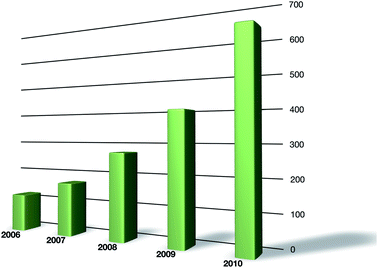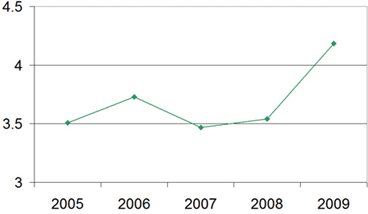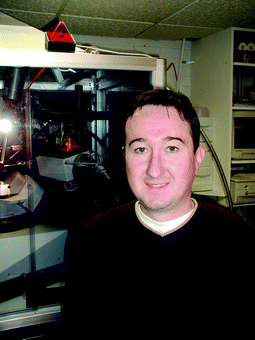From 2011, twice as much CrystEngComm!
This first editorial of 2011 witnesses a significant development for CrystEngComm, as the frequency of publication of the journal increases from 12 to 24 issues each year. This move is possible following the dramatic increase in published articles in the journal (see Fig. 1). Over the past 5 years, we have seen the journal grow in size by more than 600%! This impressive growth has only been possible due to the support of our authors and readers—thank you all. This increase in size has been followed by a significant growth in impact factor (Fig. 2) to over 4 for the first time! | ||
| Fig. 1 Growth in CrystEngComm 2006–2010. | ||
 | ||
| Fig. 2 Growth in CrystEngComm impact factor. | ||
We are delighted to announce the appointment of Prof. Len MacGillivray (University of Iowa, USA) (Fig. 3) as the new Editorial Board Chair. Len's interests include research into molecular recognition, self-assembly and supramolecular chemistry. Len has been a very helpful, and supportive, member of the Editorial Board, and we look forward to working with Len in his new role. We thank Prof. Neil Champness, whose term of office as Editorial Board Chair ended at the end of 2010. Neil holds the record of serving on the journal's Editorial Board for the longest time, and during his 10 years on the Editorial Board he has seen it grow from a very new journal to the established, valued journal that it is today. Thank you Neil, for all your help, encouragement and support.
 | ||
| Fig. 3 New Editorial Board Chair: Prof. Len MacGillivray. | ||
In 2010 we published two high impact and topical themed issues highlighting New Talent in the field of crystal engineering and the topical area of molecular solids under pressure—we plan to publish more themed issues in 2011. Many thanks to the authors of articles in these themed issues, and also to the Guest Editors, Prof. Neil Champness (University of Nottingham, UK) and Prof. Simon Parsons and Dr Stephen Moggach (both, University of Edinburgh, UK). Without their support, these themed issues would not have been possible.
2010 saw a number of online developments for the journal introduced to improve the customer service that the journal offers its authors and readers. Early in 2010, the journal moved to the RSC's new online manuscript submission system. This online system is more user friendly, and helps to streamline the submission process, making it even easier and more straightforward to submit your best manuscripts to the journal. If you have not done so already, try out our new submissions service http://mc.manuscriptcentral.com/ce. During the last quarter of 2010, we introduced PDF versions of Advance Articles, presenting the first online version of an article in a convenient, printable format. Finally, we launched a CrystEngComm blog, which is where you can read about the latest hot articles published in the journal, the most accessed articles, and other community news. To keep up to date, check the blog regularly, or sign up to the blog's RSS feed (http://blogs.rsc.org/ce)
We invite suggestions for the journal (crystengcomm-rsc@rsc.org) and comments on the CrystEngComm blog. We wish you all the best for 2011.
Dr Jamie Humphrey, Editor
Dr Ruth Doherty, Deputy Editor
RSC publishing
Quality and growth continues
It is quality that really matters at RSC publishing. And the 2009 Journal Citation Reports® proved that our quality is better than ever as our average impact factor (IF) rose from 4.9 to 5.4. It is an impressive figure, especially when compared with the average for a chemistry journal of 2.4. But we do not rely on just one or two titles to boost our average. It is our entire collection that counts: of the top 20 journals in the multidisciplinary chemistry category, 25% are from RSC publishing; and 90% of our titles have an IF over 3.Our list of titles continues to grow: Food & Function and Catalysis Science & Technology are the latest titles to join our expanding portfolio. Plus, the number of articles we have published has increased by 74% in the last 2 years alone. We remain committed to providing a world-class publishing service to our authors, and delivering cutting-edge chemical science to readers throughout the world. The IF and article growth figures provide a clear indication that more researchers than ever before are recognising journals from the RSC as a key resource to access the very best research.
2011 Books
With steady front-list growth and cutting-edge content, delivering excellence and authority, the RSC is one of the world's leading chemical science print and online book publishers. Nearly 1000 eBooks equating to one third of a million pages, the RSC eBook Collection delivers outstanding online research and opinion in a multitude of areas of the chemical sciences. Nine new RSC eBook Subject Collections offer additional flexibility. With over 90 new print titles planned for 2011, including: second editions of seminal texts; and new RSC Polymer Chemistry and RSC Metallobiology series launching, our contribution to chemistry collections worldwide is diverse, topical and high impact. Expect another first class collection of best selling chemical science titles in 2011 (www.rsc.org/books).New RSC publishing platform
Access one million journal articles and book chapters in one simple integrated search. The new RSC publishing platform has been developed in consultation with the international scientific and librarian community. Together we have identified the best and most valued interface and features that connects you with the highest quality scientific research. With one single search box, easily access our books, journals and databases for students, academics, researchers, scientists and professionals (www.rsc.org/platform).Free online access
Free online access is available to all our newest journals, and more—all you need to do is register for an RSC publishing personal account. Then, when you are logged in, you will be able to access all our free content. Currently this includes:• All content of our newest journals for the first 2 volumes.
• Any articles that are part of a special free access promotion (e.g. ‘hot’ papers, web theme issues, etc.).
• All journal content published more than two years ago (dating back to 1997).
• A sample chapter from each book in the RSC eBook collection.
With your username and password you can access the free content any time, any place—all you need is internet access. Register at www.rsc.org/personalregistration. If your institution is a current customer with IP registered, you will be able to access all free content. Other institutions can apply for free online access to our newest journals using our online form: www.rsc.org/freeaccess.
ChemSpider
Have you heard about the RSC's award winning chemical structure and text based search engine—ChemSpider? It is FREE! ChemSpider provides access to:• Millions of chemical structures.
• An abundance of additional property information.
• Tools to upload, curate and use the data.
• A multitude of other online services like the RSC publishing platform.
ChemSpider is one of the richest single sources of structure-based chemistry information. Visit www.chemspider.com (for mobile devices: cs.m.chemspider.com).
RSC 2011 conferences and events
As a learned society, the RSC hosts more than 300 international conferences and events, the following have been selected as ones you may find of interest. Visit www.rsc.org/ConferencesAndEvents to view the complete schedule of events for 2011.EICC-1: First EuCheMS Inorganic Chemistry Conference
Manchester, UK, 11–14 April.
Faraday Discussion 151: Hydrogen Storage Materials
Oxon, UK, 18–20 April.
6th International Symposium on Macrocyclic and Supramolecular Chemistry (6-ISMSC)
Brighton, UK, 3–7 July.
10th International Conference on Materials Chemistry (MC10)
The flagship event of the Materials Chemistry Division
Manchester, UK, 4–7 July.
Challenges in Organic Materials & Supramolecular Chemistry (ISACS6)
Beijing, China, 2–5 September.
International Year of Chemistry 2011
IUPAC (in conjunction with the UN and UNESCO) have proclaimed 2011 as the International Year of Chemistry (IYC), the goals of which are: to increase the public appreciation of chemistry in meeting world needs; to encourage interest in chemistry among young people; and to generate enthusiasm for the creative future of chemistry. The RSC will be leading the way in IYC 2011, supporting this important initiative through a series of events and activities.| This journal is © The Royal Society of Chemistry 2011 |
